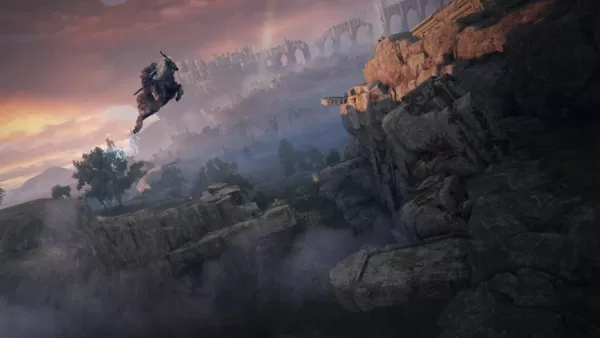Open-world games were once dominated by a checklist mentality. Maps were littered with markers, mini-maps controlled your every move, and objectives often felt more like tasks than adventures.
Then came Elden Ring, a game from FromSoftware that tossed aside the conventional playbook, eliminated the guiding hand, and offered players something unique: genuine freedom.
We've collaborated with Eneba to delve into what this has meant for the genre and why it's worthy of your admiration.
A World That Doesn’t Beg for Your Attention
Traditional open-world games clamor for your attention with incessant notifications about where to go and what to do. Elden Ring, however, takes a different approach—it whispers. It unveils a vast, enigmatic world and leaves it to you to unravel its secrets.
The game eschews intrusive UI elements, letting your curiosity lead the way. If something catches your eye on the horizon, go explore it. You might discover a concealed dungeon, a formidable weapon, or a monstrous boss eager to challenge you.
The beauty of Elden Ring is the absence of level scaling. The world remains unchanged, forcing you to adapt to it. If an area proves too tough, you can always return later. Or, if you're daring, attempt to battle a dragon at level five with a broken sword. Just be prepared for the consequences.
It's never too late to venture into the Lands Between, especially when you can snag an Elden Ring Steam key at Eneba for less than you might think.
Exploration Feels Like Discovery, Not a Checklist
In most open-world games, exploration becomes a race to the next marker, turning adventures into errands. Elden Ring turns this notion on its head.
There's no quest log pointing you in specific directions. NPCs communicate in enigmas, distant landmarks beckon without explanation, and the game never pauses to clarify its mysteries.
 This might seem daunting, but it's what makes exploration so gratifying. Every cave, ruin, and fortress feels like your own discovery. No one directed you there; you ventured out because you were curious.
This might seem daunting, but it's what makes exploration so gratifying. Every cave, ruin, and fortress feels like your own discovery. No one directed you there; you ventured out because you were curious.
Moreover, unlike other games where loot feels random, Elden Ring ensures every reward is significant. A hidden cave might yield a game-changing weapon or a spell capable of summoning a meteor storm.
The Joy of Getting Lost (and Surviving)
Most games view getting lost as a setback. In Elden Ring, it's part of the thrill. You might take a wrong turn into a poison swamp or stumble into a seemingly peaceful village only to be ambushed by grotesque creatures. Yet, these moments breathe life into the world.
While the game doesn't hold your hand, it does provide subtle clues. A statue might gesture toward an underground treasure, or a cryptic NPC might hint at a hidden boss. If you're attentive, the world gently nudges you without dictating your path.
Open-World Games Will Never Be the Same?
Post-Elden Ring, the open-world genre can't revert to its old ways. FromSoftware has demonstrated that players crave mystery, challenge, and the joy of discovery over constant hand-holding. We can only hope other developers follow suit.
If you're ready to immerse yourself in a world that not only encourages exploration but demands it, digital marketplaces like Eneba offer fantastic deals on gaming essentials. Whether it's Elden Ring or other must-play titles, your next adventure awaits just a few clicks away.















